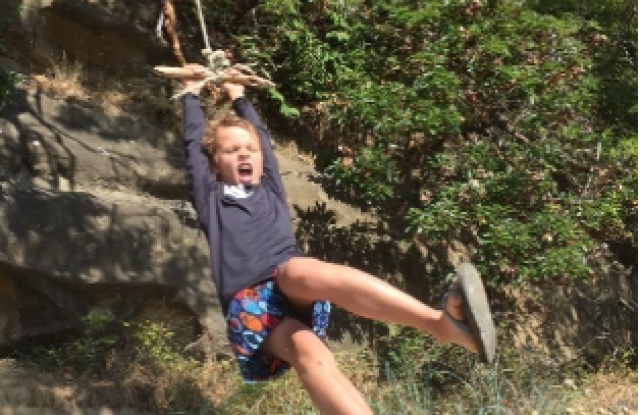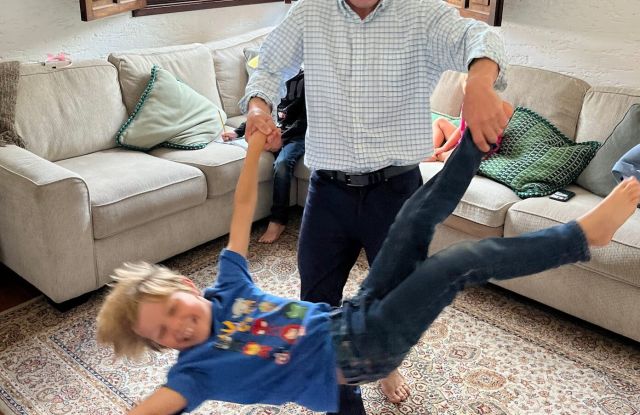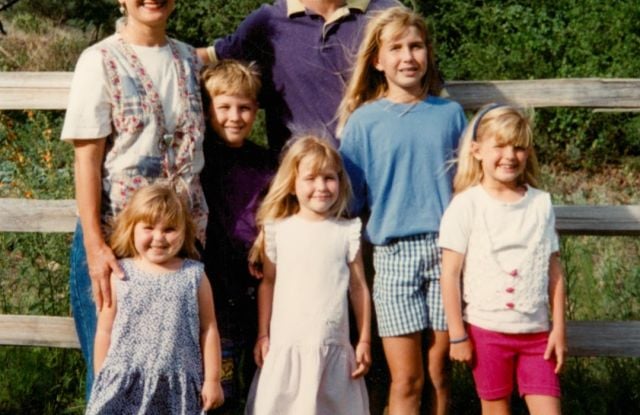How to Repent to Your Children

It’s almost May, a time when many children leave the nest. Some of you parents don’t have much time left to finish some important business before your child leaves home. So many young people tell me, “I wish my parents had said they were sorry to me, but their pride got in the way.”
Beyond that, I speak from personal experience – Karen and I have five awesome children who have grown up and are in varying states of transition to adulthood. So far, four of them have needed to have a serious conversation with me about some way in which I had failed them.
And hey, it wasn’t the end of the world, they needed a debrief of sorts. They needed my help in moving our relationship to a new phase. Having worked hard at raising them, I knew I needed to help ensure that they didn’t carry any dysfunction from me with them into adulthood. Part of their transition required us taking stock of the 18 years or so where they had lived under our roof and Karen and I had the privilege of raising them. How did it go? What could we have done differently or better?
I have what I consider to be great relationships with my kids, but here’s my report from the other side of this transition: Each of them has, of their own initiative, come to me to debrief some painful aspect of childhood that I unwittingly had a part in. The sad part is, I was clueless about it and they had never wanted to hurt my feelings.
Every time a different child came to have “the talk,” it was hard. I can’t tell you the remorse I felt for the fact that they had to carry this painful part of their lives by themselves. We have few secrets in our home, but for whatever reason, each child could not bring themselves to confront the situation earlier.
Each came to me and said, “Dad, I’d like to talk to you about something when you’ve got time.” Internally I thought, “Gulp, here it comes – all that effort over the last 18 years and still I have failed my kiddo in some way.” But I gathered up my courage, realizing that, if it was hard for me, it was probably even more difficult for them.
So here’s what I would do differently and here’s my advice: If you’re a parent approaching the empty nest phase of life, let me suggest you brace yourself for and even initiate this debrief, making sure it’s thorough and honest. And it will probably be easiest for everyone if you will search your heart and ask God to show you any pain that you have caused them.
If you want your child to make a good transition, it is essential for you to own any pain that he or she has stuffed. The temptation is to defend or explain your bad parenting. Let me be clear: Do not do this! The conversation will probably feel extraordinarily tender for both of you, but as the parent, you have always had the power and now must use that to help them move thru their pain and into a new phase of autonomy.
Specifically this means you need to repent to your child not only for anything you did that was hurtful and wrong, but anything that they took in the wrong way as well. That’s where I messed up – I simply had no idea. Remember, this transaction is not about you; it is about helping your child to leave the nest with as little baggage as possible.
Actually, I probably got lucky. My kids initiated our debrief. This may not be the case for many of you. Because your child finds the whole subject supremely awkward and does not trust you to shut up and take your lumps, you have the delicate task of trying to make it safe for them.
Probably the only way to do this is to make a list of all the ways that you may have hurt your child and repent to them for it.
Depending on how deep the pain you caused and how frigid the atmosphere in the room, you may need to begin by writing a letter to your child. The point of the letter is to create the possibility of a conversation where you repent as completely and clearly as possible. If you bobble the ball and give even a hint of defensiveness or manipulation, you may delay the process for a year or two. My advice to you fathers is, be a man and take your lumps.
To get you thinking, here’s a list of things you may need to repent for:
- If you disciplined them out of anger.
- If you neglected them at some point as they grew up.
- If you yelled at them or abused them in some way.
- If you failed to love your spouse as you should have.
- If you didn’t protect them adequately (from pornography, from violent video games, from the opposite sex, from family members, from abuse).
This list could go on and on. The point is, you want to help launch your kid out into the world well. But, given what’s happened to them that you may be ignorant of, it’s going to be hard – it will require a lot of you. I recommend taking a day to fast and pray. Ask God to reveal anything you need to repent for in their upbringing. Review each phase as thoroughly as possible with God. Write down in a journal anything he shows you. Then, follow through and release your child of their baggage. It will be the best graduation gift you ever gave them.
*A couple of caveats: First, your child may not be mature enough to handle this. He or she may be stuck in a victim mentality. They may see you as worse than you are. Don’t expect them to respond with grace or even appropriately. Your objective should be to make it easier for them to navigate the world – you are not responsible for their response. Second, for parents of younger children, don’t wait till the last second to come clean. The longer you wait, the greater the potential damage to your child.
For young people reading this who wish that your parents would read this, but who also don’t want to risk forwarding this to them, check in with tomorrow’s blog where I’ll address Things I wish my children had told me. You may want to forward that to them instead.



This is really great, Seth. I have a great relationship with my Dad now, but those things did happen. I tried to have this conversation with him awhile ago, but it didn’t go so well. He got really defensive and I had to drop it. So I’ve just done my best to really forgive him and be at peace with that.
This is so true Seth! It was hard growing up in a Christian household, knowing they were making mistakes, but were never humble enough to ask for forgiveness. It was the child, and the child only, who ever asked for forgiveness. It is so sweet for a child to hear their parent come to them and say “I’m sorry”. My mother and I apologized to one another a few years ago at a women’s retreat, by my abusive father has yet to repent, and we haven’t seen eachother in 5 years. One thing I have learned is to ask for forgiveness…even though I don’t do it enough. Thanks for the reminder!
One of my best memories is when my dad apologized to me. It wasn’t this magnitude of repentance… but we had an argument. He had assumed I had done something wrong when I actually did what I was supposed to (a rare occassion, I’ll admit!). I was so angry at his assumptions that I left the house until after he had gone to work. When I came home there was a note from him apologizing to me. All the anger left immediately and I even took the note to my youth pastor and was thrilled to show him how awesome my dad was. My youth pastor even used it in his sermon 🙂 The power of a parent asking forgiveness is huge! Whether on a small scale like this or in a time of repentance like you describe…
Beautiful stuff on reconciliation here. I’m working thru this myself.
Thanks for this. My kids are still young enough to work on practicing this before they leave home, so hopefully I can instill a spirit of humility in them. I know I’ve tried this with my parents, but have to admit that I wasn’t exactely gracious in confrontation, more aggressive. Naturally, I got defensive responses, but God did use it to help get through some of the issues. Tough topic to live out.
One of the MOST POWERFUL events of my life occurred when I was 17 years old. My father sat us (my brother and I) down on the couch in our living room, and confessed to us, unsolicited by us, to his anger, his neglect, etc… I was 17 years old, and a long way from relationship with God. I wanted to be deeply touched by the event, but there was a MOUNTAIN of cynicism and distrust between who he had been, and who he claimed he was becoming.
Over the next few months, I watched him, waiting to throw all the lies about being sorry and wanting to change back in face. That opportunity never came.
My dad changed that day! The healing that that confession and repentance brought into my life could never be explained in simple text.
It has been 15 years since then, and he truly has become the person he claimed he was going to be! What an AWESOME start is was to be present for that confession when he humbled himself to us, and asked our forgiveness!
You are right Seth! There is little more important a parent can do than face their failures in humility and repentance. It changed my life when my father did!
thanks for always hearing us and making yourself a safe place to come.
I love you dad!
I loved the comments here – some awesome stories. I hope it encourages other parents who are out there wanting to help their children unburden themselves of their baggage.
Any suggestions as to how to approach defensive parents? I know that God is calling me to have a conversation of this sort with my parents. Not to accuse them but to vocalize that I have forgiven them. I am done so much healing with out having to bring it up to them, but I feel that if they are going to go deeper someone has to give them a little push. God keep saying “Why would they go there if you won’t?” Just looking for some encouraging words. I am leaving for the World Race in July and I know that this conversation needs to be started before I leave. Thanks for writing this blog. I am going to pray about sending it to my parents. Thanks for always being real. It really rocks.
What a wonderful and insightful article and reminder. I truly try to always say I am sorry to my children when I have blown it with them, and my husband does as well. Neither of us grew up with parents who EVER said they were sorry for anything, so we felt God leading us to the entirely opposite direction in that respect. I tried to have this conversation years ago with my Dad, and it didn’t go well. He basically said that he didn’t ever do anything wrong and that he would do it all the same again if he had to do it again. Wow. Anyway, the Lord has done much healing in my heart and allowed me to see my Dad through His eyes. I really love him, and I know that he just really didn’t have the skills or knowledge to raise me as I needed. But he really did the best he could at the time, and I love him regardless. That has taken some years to get to that point, and counseling, etc, but it has been worth it.
Thank you for a wonderful article! How blessed your children are to have you as their earthly Dad. Blessings!
This article is a great read.im still sifting net finding a way to start communication with my son of 19 yrs after we stopped talking. It fit striped after a verbal physical duel occurred with respect to what you have described as angry disciplining.
I am 51. He is our only child.
Your advice?
My advice is to begin by writing your son a letter. Show the letter to someone who can hold you accountable and counsel with you. Ask them if you should send it or not. Pray about it together before sending it. Let us know how it goes. I will pray for you.
I absolutely love this! I have 3 adult children and one still at home. I am sure much healing can come from this. I love your wisdom on suggesting some
Prayer, fasting, ATL first.
Do you have any suggestions about how to handle conversations regarding past hurts regarding their father who has passed away from cancer years back? I know they do not want to speak negatively about him but I know there must be some things they need to talk about. Thanks so much for this!
Seth and I had the chance to discuss this. It might be helpful to process the impact of their father on them by asking a few questions:
1. What could they always depend on him for?
2. What could you never depend on him for?
3. How did that make you feel and how did that make you the person you are today?
Next, ask:
4. If I could say anything to him now, what would I want to say? (They may want to elaborate this in the form of a letter to him)
5. If I could hear anything from him, what would it be?
Thanks Seth. A very timely post for my husband and I as our son Alex is graduating from high school in a few weeks. Thanks for sharing the need to “debrief” our child along with the guidance of just “how” to do that.